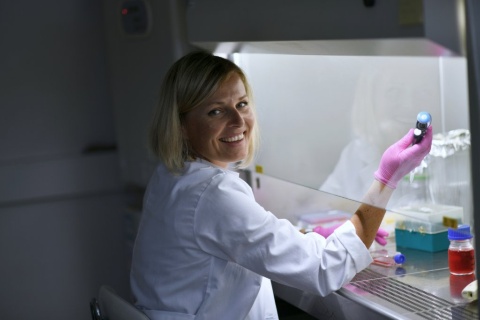
The undeniable benefits of breastfeeding for the health of babies
06. 10. 2022
The positive effects of breastfeeding and breast milk on the right growth, health, and development of babies are indisputable. What factors can affect the quality of this wholesome substance? And what is the optimal length of time to breastfeed? The answers are suggested by two new studies by Czech researchers from the Institute of Experimental Medicine of the CAS and the Institute of Physiology of the CAS, published in the journals Biomedical Journal of Scientific & Technical Research and Food Chemistry.
Homo sapiens is only one of approximately 6,500 mammalian species. The definition states that humans are vertebrates whose young feed on their mother’s milk, which they suckle from the breast, or rather, mammary glands. The very naming of our class of vertebrates, Mammalia, shows the huge importance of breastfeeding and breast milk to more than just our species. It contains an ideal cocktail of nutrients and biologically active substances that are essential for the rapid growth and development of offspring.
The production of breast milk is influenced by the hormone prolactin, and lactation is influenced by the hormone oxytocin, known as the ‘love hormone’, which plays an important role in building the emotional bond between breastfeeder and child. Many factors influence the composition and quality of milk, such as diet, lifestyle, method of delivery, and length of pregnancy. It is precisely this issue that was the focus of the study by Kristýna Brejchová from the Institute of Physiology of the CAS. The first part of the study looked at the effect of premature or caesarean delivery on the composition of first milk, or colostrum, produced by the mammary glands right before and about three to five days after birth.

Kristýna Brejchová works at the Laboratory of Metabolism of Bioactive Lipids at the Institute of Physiology of the CAS.
Over five years, the researchers collected a total of 137 milk samples from donors at the Institute for Mother and Child Care in Prague. They came from mothers with spontaneous or caesarean delivery at term as well as mothers who gave birth prematurely. The donors provided samples of colostrum and mature milk. Subsequent analysis revealed that both caesarean and premature delivery had a slightly negative effect on the composition of colostrum. “We believe that the mammary glands of mothers did not have enough time to initiate fully-fledged milk production. However, in four weeks at the lastest, this negative effect disappeared and mature milk composition resembled the milk of mothers who delivered spontaneously at term,” Kristýna Brejchová explains.
The researcher also added that if the mother of a premature baby does not produce enough milk overall, it is advisable to replace it with milk from milk bank donors. However, if the mother produces enough milk, even though its composition differs in terms of the levels of certain lipids due to premature or caesarean delivery, there is no reason to replace it and it is beneficial to continue breastfeeding. The results show that optimal milk composition is an important issue in the care of premature infants and should be given great attention.
Fats in breast milk
Already in a previous project from 2018, researchers discovered special lipids in colostrum – fatty acid esters of hydroxy fatty acids. “Because it’s such a long name, we use the acronym FAHFA to designate these fatty acids. Some of this group of lipids have anti-inflammatory effects,” Brejchová explains. “Moreover, in our new study, we found complex lipids in breast milk – triacylglycerol estolides – that bind anti-inflammatory FAHFAs in their structure. One of the enzymes contained in milk can break them down and release substances with beneficial effects on the health of the newborn,” the researcher adds. These complex fats, which have so far only been detected in adipose tissue in the human body, are present in small amounts in all milk samples, regardless of the time and manner in which the infant enters the world.

Researchers have no doubt about the beneficial effect of breastfeeding. However, the composition of breast milk has yet to be fully studied.
It has now been shown that these complex fats are present in small amounts in all milk samples, irrespective of the mode and term of delivery of the newborn. Thus, neither premature delivery nor delivery by caesarean section play a role in their formation. “It is evident, then, that breast milk is the ideal diet for babies and breastfeeding comprises an irreplaceable source of nutrition even if the birth is not ideal,” Brejchová concludes. Research has shown, among other things, that the composition of breast milk has not yet been studied to its full extent. Experts are still finding new substances in breast milk that have a beneficial effect on human health.
What is the optimal duration of breastfeeding?
This issue has been debated by experts and the general public alike for many years. There is still no consensus. Some advocate months, others years. The duration of breastfeeding also played a significant role in the study which was conducted by experts led by Radim Šrám from the Institute of Experimental Medicine of the CAS with colleagues from the University of South Bohemia in České Budějovice, the České Budějovice Hospital, and the L. Pasteur University Hospital in Košice.
They focused in particular on a factor that Radim Šrám has been studying for several decades now – air pollution. It can lead to slowed cognitive development and chronic respiratory and cardiovascular diseases. The adverse effect of elevated concentrations of fine PM2.5 (particulate matter smaller than 2.5 microns) on children’s psychological development has already been proven in previous research.
The new study by Czech and Slovak experts focused on the development of cognitive functions in children in relation to the duration of breastfeeding. They looked at groups of children from the Czech districts of Karviná and České Budějovice, which differ significantly in the level of air pollution found there. The researchers processed data from a total of 147 children born in 2013 and 2014 in the two cities: 80 from České Budějovice and 67 from Karviná. Cognitive function was assessed in five-year-old children. They used the Bender-Gestalt test, which tests children’s ability to copy geometric designs off of individually presented index cards, and the Raven’s test (Raven’s Matrices), which measures children’s understanding of the complexity of patterns and their ability to store and recall information, i.e., their problem-solving skills.

The long-term research focus of Radim Šrám from the Institute of Experimental Medicine of the CAS has been the impact of air pollution on children’s health.
Researchers obtained information about breastfeeding and child development from the questionnaires presented to the mothers. They found that breastfeeding for a period of longer than six months positively affected the results of both aforementioned psychological tests. “In České Budějovice, full breastfeeding for three months was enough to have a positive effect, while in Karviná, where air pollution is high, a minimum of six months was needed,” Šrám added.
The results suggest that full breastfeeding for a period of six months or more has a greater effect on cognitive development in both groups of children. This was more clearly demonstrated in the Bender-Gestalt test, which measures visual and motor skills. It can then be assumed that a longer duration of breastfeeding is particularly beneficial for the cognitive development in children that live in areas with high levels of air pollution.
The studies are available on the website of the Institute of Experimental Medicine of the CAS and the website of the journal Food Chemistry.
________________________________________
Prepared by: Markéta Wernerová, Division of External Relations, CAO of the CAS
Photo: Shutterstock; Institute of Physiology of the CAS; Stanislava Kyselová; Division of External Relations, CAO of the CAS
 The text is released for use under the Creative Commons license.
The text is released for use under the Creative Commons license.
Read also
- Statement of the Czech Academy of Sciences on the current situation in Iran
- The extraordinary life of swallows. What do we know about them?
- The Library of the Czech Academy of Sciences in the era of ones and zeros
- Genome editing in plant breeding – experts discussed food security in Prague
- A device which detects substances in human breath with molecular-level precision
- Straws as a symbol of pollution: single-use plastic products are on their way out
- Eleven researchers received honorary medals from the CAS for their service to science
- Aqueous batteries: a promise of cheap and safe energy for the future?
- Czechoslovakia in the Orient: The Orient in Czechoslovakia exhibition opens
- The little owl on the brink of extinction with a weak 2022 nesting season
The Czech Academy of Sciences (the CAS)
The mission of the CAS
The primary mission of the CAS is to conduct research in a broad spectrum of natural, technical and social sciences as well as humanities. This research aims to advance progress of scientific knowledge at the international level, considering, however, the specific needs of the Czech society and the national culture.
President of the CAS
Prof. Eva Zažímalová has started her second term of office in May 2021. She is a respected scientist, and a Professor of Plant Anatomy and Physiology.
She is also a part of GCSA of the EU.